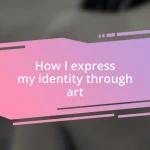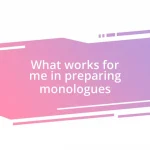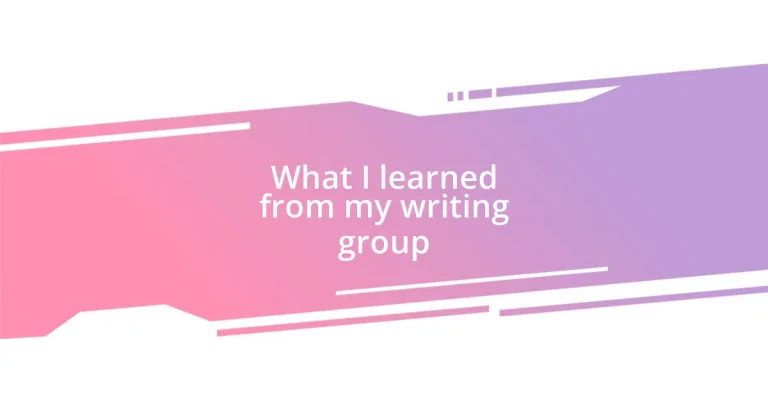Key takeaways:
- Group dynamics highlight the importance of tailored feedback, emphasizing listening and understanding individual needs.
- Effective communication strategies, such as active listening and open-ended questions, foster deeper exploration and emotional connections in discussions.
- Balancing critique with support and sharing vulnerabilities enhances relationships within the group, promoting long-term growth as writers.
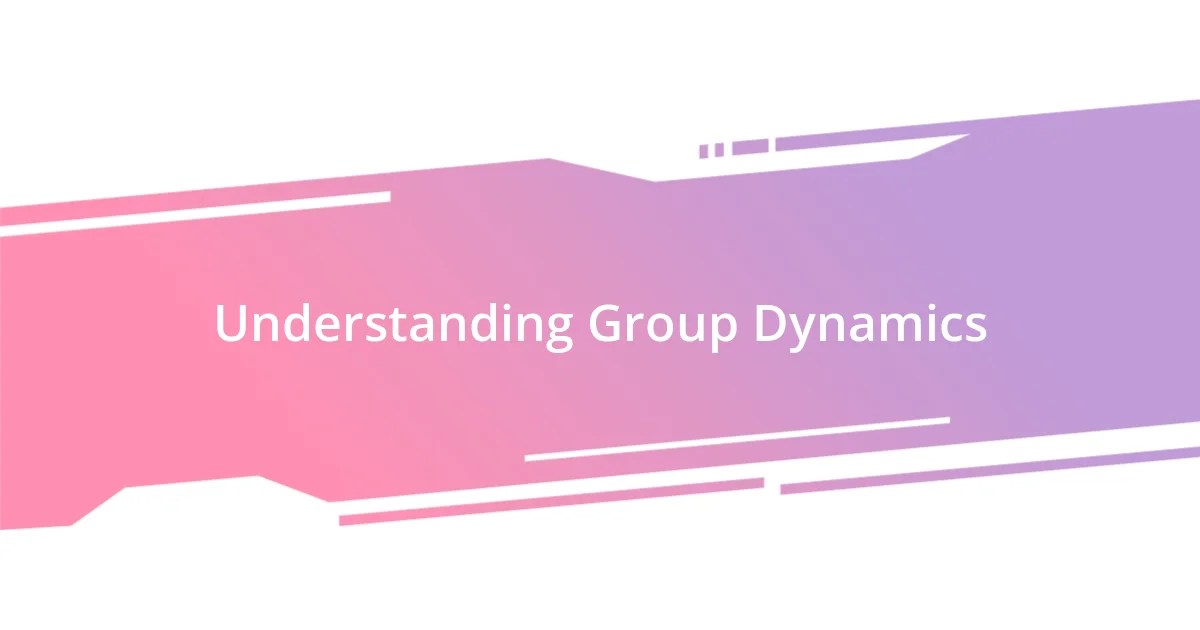
Understanding Group Dynamics
Group dynamics can be fascinating and complex. I remember the first time I sat in on my writing group, feeling an electric mix of excitement and anxiety. It struck me how each member’s energy influenced the overall atmosphere—some were encouraging, while others were more critical. Have you ever noticed how a single person’s vibe can shift the entire group?
As I became more familiar with the dynamics at play, I realized that listening is just as crucial as speaking. I learned to pay attention to how our group responded to different types of feedback. For instance, I saw how some people thrived on constructive criticism, while others required gentler encouragement. This made me reflect: How often do we tailor our feedback based on the individual’s needs?
Conflicts can arise in any group setting, and I’ve had my share of moments where disagreements turned into powerful learning experiences. One heated discussion over a story’s direction led to a breakthrough on character development, which I never expected. Isn’t it remarkable how tension can sometimes lead to deeper insights? Understanding each member’s perspective truly transformed our interactions and helped us grow together as writers.
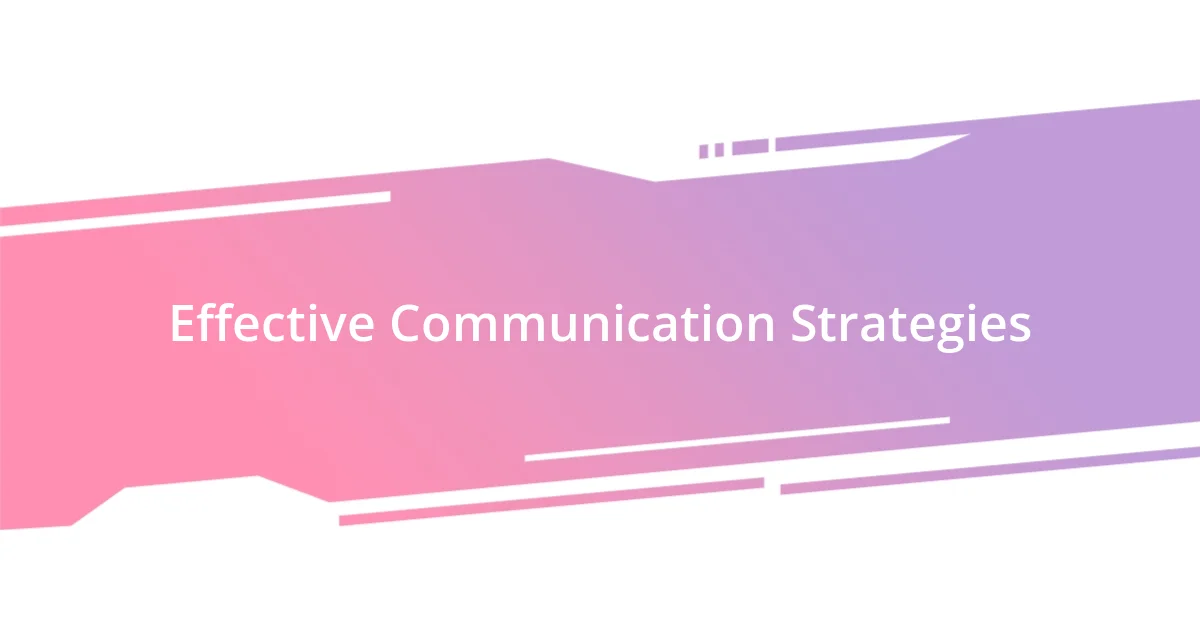
Effective Communication Strategies
Effective communication in a writing group goes beyond simply sharing ideas; it’s about hearing each other deeply. I recall one meeting when a fellow writer struggled with their piece. Instead of offering immediate solutions, we practiced active listening, which allowed them to express their thoughts fully. This experience taught me that sometimes the most powerful tool we have is our ability to listen without judgment. Have you ever found that letting someone talk it out can lead to breakthroughs?
Another strategy I embraced is the importance of asking open-ended questions. During discussions, I’ve seen how these questions invite richer responses and promote deeper exploration of ideas. For instance, instead of asking, “Did you like my story?”, I learned to ask, “What emotions did my story evoke for you?” This subtle shift not only engages others but also opens the door for insightful discussion. I often think about how this simple change transformed my understanding of my writing’s impact on readers.
Creating a safe space for sharing is essential in fostering effective communication. There was a moment when I shared a particularly personal piece that left me feeling vulnerable. The support and positive feedback from my peers replenished my confidence and encouraged me to keep writing from the heart. This highlighted for me how vulnerability can strengthen connections within the group and lead to more authentic exchanges. Have you considered how your safety in sharing can affect your creative output?
| Communication Strategy | Description |
|---|---|
| Active Listening | Focus on truly hearing what others say to deepen understanding. |
| Open-Ended Questions | Encourage expansive dialogue and insight through thought-provoking queries. |
| Creating Safe Spaces | Foster an environment where sharing from the heart is welcomed. |

Constructive Feedback Techniques
When it comes to constructive feedback, clarity is paramount. I find that being specific about what works and what doesn’t helps the writer understand their strengths and areas for improvement. For instance, during a critique session, I pointed out how a particular character’s motivation felt unclear. This feedback opened up a discussion that not only benefited that writer but also enriched my own understanding of character development.
Here are some effective techniques I’ve embraced for delivering constructive feedback:
- Use “I” Statements: Frame feedback around your perceptions. For example, say, “I felt confused by the character’s actions,” instead of “Your character is poorly written.”
- Be Balanced: Always aim to highlight what is working well along with what can be improved. This creates a more encouraging atmosphere.
- Encourage Questions: After offering feedback, invite the writer to ask questions. I often say, “What part of this feedback resonates with you?” This way, dialogue flows and the feedback becomes a collaborative effort.
- Suggest Alternatives: Whenever possible, provide options. For instance, instead of just saying a scene doesn’t work, I often suggest ideas for how it could be reimagined.
I’ve learned that feedback isn’t just about correcting; it’s about nurturing growth. I recall giving feedback on a poem that lacked emotional depth. Rather than just saying it needed more feeling, I shared how it reminded me of a similar life experience where I felt utterly lost. By opening up, I noticed the writer engaged more deeply with my suggestions, sparking an inspiring revision process. It made me realize that sharing our own experiences can create connections that enhance feedback and learning.

Setting Goals with Your Group
When setting goals with my writing group, I’ve learned it’s crucial to have clear, achievable targets. For instance, we recently decided that each member would submit a new piece every month. I remember the exhilaration I felt when we collectively committed to sharing our first drafts, which kept us accountable and motivated. Have you ever thought about how shared goals can spark creativity in your writing?
Another key aspect is discussing our individual objectives within the group context. One meeting, I shared my aspiration of improving my dialogue writing. Surprisingly, several others had similar goals, which led to collaborative brainstorming sessions on effective techniques. I often reflect on how this kind of synergy can enhance our skills collectively – it’s like each of us brings a different puzzle piece to the table.
Lastly, revisiting and adjusting our goals as a group has been equally valuable. During one of our check-ins, I realized I was stretching myself too thin with my targets. By voicing my struggles, I found that many others felt the same. This openness allowed us to recalibrate our expectations and focus on quality over quantity. How about you? Have you ever needed to pivot on your writing goals, and how did that affect your progress?
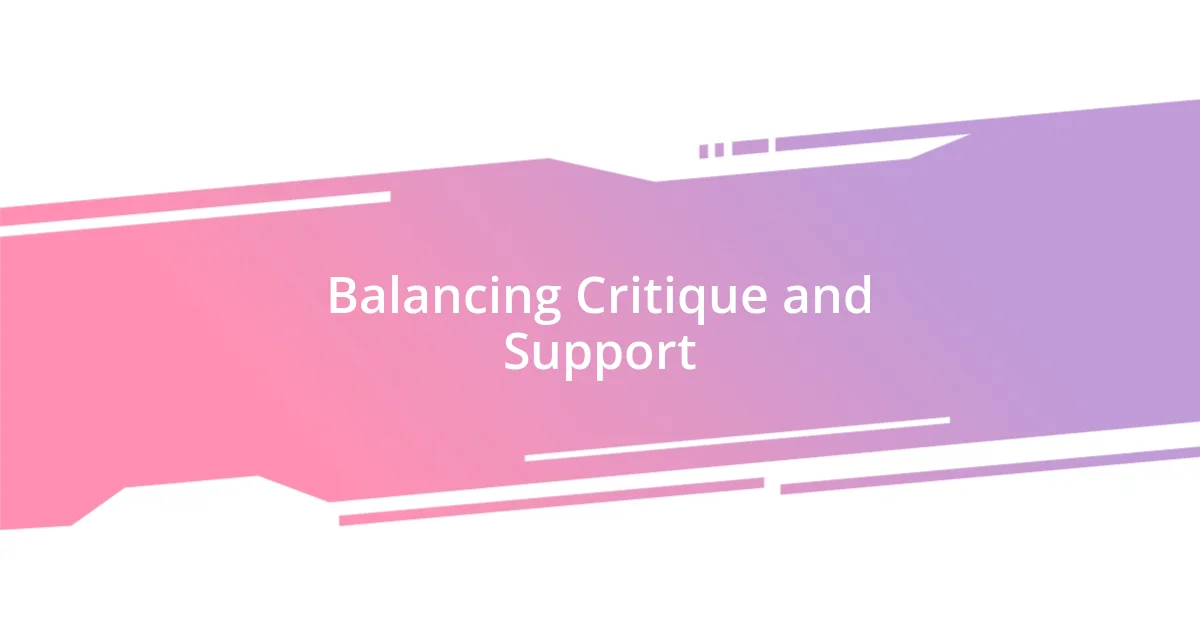
Balancing Critique and Support
Balancing critique and support can be a delicate dance. I’ve noticed that when I provide feedback, it helps to start with a positive observation. For instance, during one session, I praised a writer’s vivid imagery before gently suggesting they might clarify their narrative arc. That initial affirmation set a tone of trust and receptivity, which made it easier for them to hear my critique.
Yet, I also recognize that too much positivity can dilute the effectiveness of the feedback. I once attended a group where everyone focused solely on what they liked, avoiding tougher conversations. While the supportive environment felt great, it left me wondering—were we really helping each other grow? I’ve come to believe that honest critiques, delivered with empathy, can propel everyone forward in their writing journeys.
In my experience, it’s crucial to foster an atmosphere where vulnerability is welcomed. I’ve often shared my own writing struggles when providing feedback. For example, I once admitted to grappling with pacing in my own work, which resonated with others. This vulnerability opened the door for deeper discussions and made us feel more connected, reminding me that we are all in this together. Have you ever felt that sharing your own challenges could strengthen your relationships within a creative group?
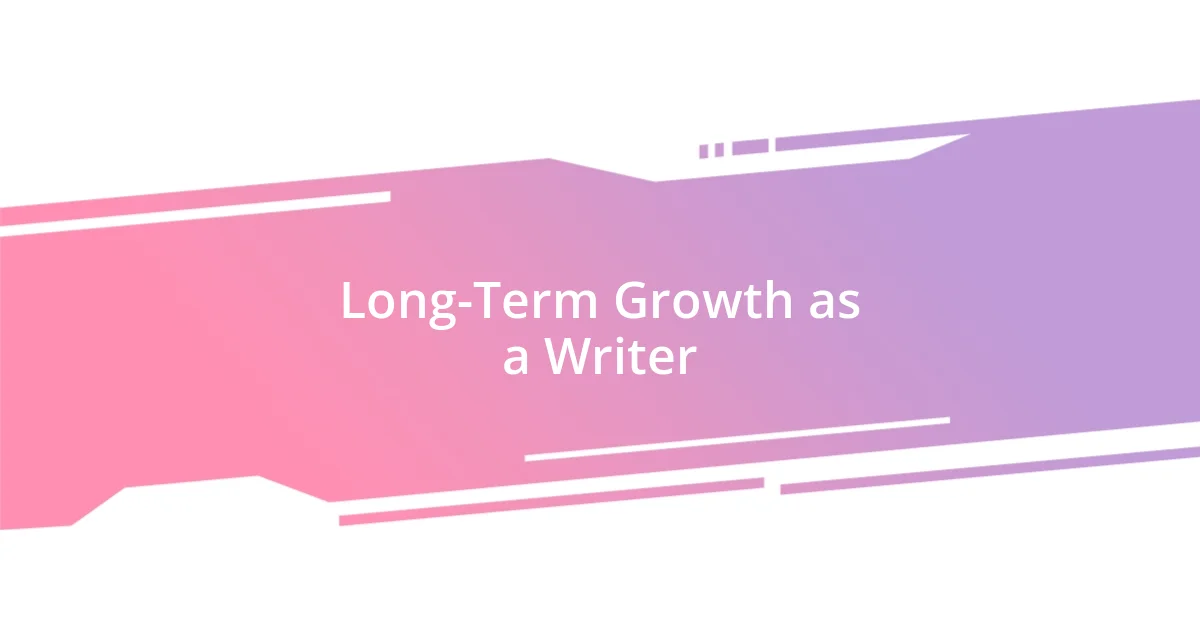
Long-Term Growth as a Writer
Long-term growth as a writer often stems from the relationships we build, and I’ve found that my writing group has played a pivotal role in my development. There was a moment when I struggled with finding my voice, and hearing others discuss their journeys reassured me that I wasn’t alone. It struck me—how powerful it is to share vulnerabilities, as they often spark engaging conversations that drive our writing forward. Have you ever felt most inspired after hearing someone’s struggle resonate with your own?
In our group discussions, I’ve learned the importance of patience and persistence in honing our craft. I remember one member who had been working on a novel for several years. Her dedication to showing up week after week reminded me that the writing journey is a marathon, not a sprint. I still think about how her commitment to long-term projects encouraged me to explore deeper topics in my own work. Isn’t it fascinating how one person’s dedication can shift your perspective on what it means to grow as a writer?
As time has passed, I’ve also noticed that our conversations have evolved, much like our writing styles. Initially, we focused heavily on structure and mechanics, but now we delve into deeper themes and emotional resonance. I feel this transition reflects our growing confidence as writers. It makes me wonder—how often do we allow ourselves the space to evolve? Sharing our individual transformations within the group has enriched my understanding of storytelling, and I cherish the growth I’ve experienced alongside such talented peers.



